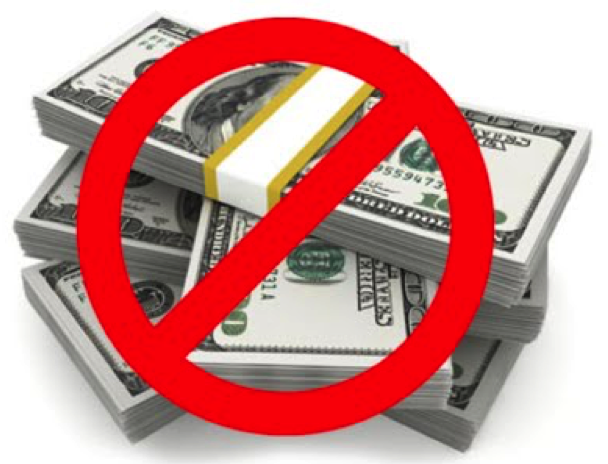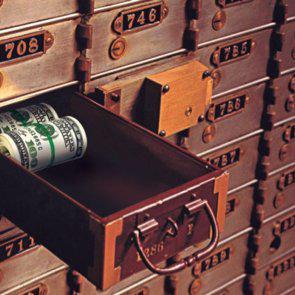The War on Cash Escalates
The Federal Reserve bank and its owners, the largest banks on Wall Street, want badly to be able to charge you interest for the privilege of depositing your funds. The problem is getting you to stand for it.
Depositors already complain vigorously about zero percent returns on checking and savings accounts. If they must start actually paying the bank to hold funds on deposit, many will opt to simply withdraw the cash and stuff it under their mattress or into a safe deposit box. That simply won’t do.
The Goal Is to Force You to Deposit Cash and Charge YOU Interest
Bankers in the U.S. can learn something from the Swiss. The Swiss National Bank recently implemented negative interest rates without first solving the "problem" of how to prevent cash from fleeing the banks. Predictably, depositors started doing some math.In one example, a sizable Swiss pension fund, calculated it would save 25,000 francs for every 10 million it held in the bank by simply withdrawing those millions and taking the bales of paper francs to be kept in a vault. The vault storage fees are less expensive than the negative interest rate.
Jumping the gun on the implementation of negative rates put the Swiss banks in an awkward situation. Like all fractional reserve lenders, they don’t have anywhere near enough cash to make good on the withdrawals that may be coming. The bank holding the pension money had little choice but to refuse the client’s demand for millions of francs – funds the client is contractually entitled to. Telling clients “sorry, you can’t make a withdrawal” never goes over too well!
Nevertheless, the Swiss National Bank is sticking to its guns. It is encouraging retail banks to be “restrictive” with regards to cash withdrawals. And it is berating actors such as the pension fund for trying to circumvent negative interest rates. Apparently no one should be questioning the wisdom behind the policy! But the bluster isn’t hiding the fact that bankers stand upon shaky legal ground. The potential for a run on the banks remains.
Insiders here look anxious to avoid a similar situation. Willem Buiter, the chief economist at CitiBank, thinks he’s got the answer to this banker’s quandary. Simply abolish cash. Or tax it punitively. He isn’t the only one supporting this radical solution. Other economists, including the prominent Harvard professor Kenneth Rogoff, also think banning cash is a grand idea.
If depositors’ response to negative interest rates is predictable, so is the reaction from central planners. Effective herding is all about limiting the escape routes for members of the herd.
Eliminating physical cash may well be a longer-term project, but it is not something the Fed can likely implement any time soon. In the meantime, there are other ways to prevent depositors from making their escape.
For starters, officials can criminalize the use of cash above certain amounts.
Banks can also implement new policies of their own. Joseph Salerno from the Mises Institute discovered JPMorgan Chase leading the way. The bank very recently began test driving new rules in Cleveland as well as other markets.The bank will no longer accept cash from customers who want to use it to make mortgage payments, pay credit card balances or to cover their automobile loan.
No Cash or Bullion Allowed in Safe Deposit Boxes
Chase also rolled out new restrictions on what can be put into safe deposit boxes. The “Updated Safe Deposit Box Lease Agreement” customers must sign states, “You agree not to store any cash or coins other than those found to have a collectible value.”
Expect other banks to follow suit shortly. The new rules go on top of decades of inflationary monetary policy, making paper currencies worth perpetually less over time. Clearly bankers are plumbing customers’ tolerance for pain.
More and more people will be looking for ways to make it stop. This is where things promise to get interesting for gold and silver investors.
Financial repression, the attempt to force citizens to accept the government shears, has long been a driver of demand for physical precious metals. This demand will accelerate as measures become more draconian. Some bank customers, perhaps even the Swiss pension fund mentioned above, will decide that bullion is a better option than sitting on bales of depreciating paper currency or paying banks to hold deposits.
Here in the U.S., the banks are central to just about all bureaucratic efforts at control. Look for droves of people to try and sidestep the banks and the dollar itself. The next decade or two is almost certain to see rapid innovation in alternative ways to store value and transact. Ways that preserve privacy and are beyond the reach of bureaucrats. As these new systems seek to gain trust and acceptance, precious metals are almost certain to play a much bigger role.
Information on these pages contains forward-looking statements that involve risks and uncertainties. Markets and instruments profiled on this page are for informational purposes only and should not in any way come across as a recommendation to buy or sell in these assets. You should do your own thorough research before making any investment decisions. FXStreet does not in any way guarantee that this information is free from mistakes, errors, or material misstatements. It also does not guarantee that this information is of a timely nature. Investing in Open Markets involves a great deal of risk, including the loss of all or a portion of your investment, as well as emotional distress. All risks, losses and costs associated with investing, including total loss of principal, are your responsibility. The views and opinions expressed in this article are those of the authors and do not necessarily reflect the official policy or position of FXStreet nor its advertisers. The author will not be held responsible for information that is found at the end of links posted on this page.
If not otherwise explicitly mentioned in the body of the article, at the time of writing, the author has no position in any stock mentioned in this article and no business relationship with any company mentioned. The author has not received compensation for writing this article, other than from FXStreet.
FXStreet and the author do not provide personalized recommendations. The author makes no representations as to the accuracy, completeness, or suitability of this information. FXStreet and the author will not be liable for any errors, omissions or any losses, injuries or damages arising from this information and its display or use. Errors and omissions excepted.
The author and FXStreet are not registered investment advisors and nothing in this article is intended to be investment advice.
Recommended Content
Editors’ Picks
EUR/USD edges lower toward 1.0700 post-US PCE

EUR/USD stays under modest bearish pressure but manages to hold above 1.0700 in the American session on Friday. The US Dollar (USD) gathers strength against its rivals after the stronger-than-forecast PCE inflation data, not allowing the pair to gain traction.
GBP/USD retreats to 1.2500 on renewed USD strength

GBP/USD lost its traction and turned negative on the day near 1.2500. Following the stronger-than-expected PCE inflation readings from the US, the USD stays resilient and makes it difficult for the pair to gather recovery momentum.
Gold struggles to hold above $2,350 following US inflation

Gold turned south and declined toward $2,340, erasing a large portion of its daily gains, as the USD benefited from PCE inflation data. The benchmark 10-year US yield, however, stays in negative territory and helps XAU/USD limit its losses.
Bitcoin Weekly Forecast: BTC’s next breakout could propel it to $80,000 Premium

Bitcoin’s recent price consolidation could be nearing its end as technical indicators and on-chain metrics suggest a potential upward breakout. However, this move would not be straightforward and could punish impatient investors.
Week ahead – Hawkish risk as Fed and NFP on tap, Eurozone data eyed too

Fed meets on Wednesday as US inflation stays elevated. Will Friday’s jobs report bring relief or more angst for the markets? Eurozone flash GDP and CPI numbers in focus for the Euro.